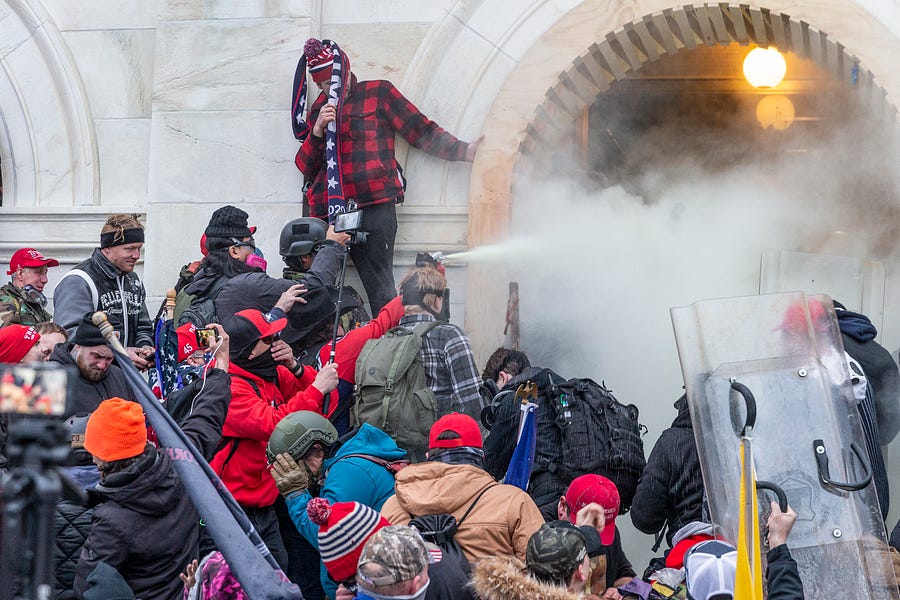Hello, everyone. I hope you’re doing well despite… everything. A couple of notes:
-
Today’s newsletter was going to be about what a Democratic Senate will look like now that they’ve won both seats in Georgia. But we’ll have to save that for another time.
-
The first issue of Uphill tried to prepare readers for the Electoral College counting process. Needless to say, it didn’t quite unfold the way we expected.
The Cost of Lying to People
Republican lawmakers misled millions of people into believing the results of a legitimate election could be overturned. Many of them viewed contesting the outcome as a relatively easy way to gain political currency among Trump supporters, knowing all the while that their efforts would have no real impact on who will be sworn into office in two weeks.
The deception—primarily led by Trump, yet enabled by members of Congress—set the stage for the violence that unfolded at the Capitol Wednesday. Four people died during the course of the siege, and one Capitol Police officer passed away late Thursday night after being gravely injured by someone in the mob. More than 50 other law enforcement officers were injured, with several still hospitalized.
“They believed that the outcome was going to change,” Sen. Marco Rubio said of the assailants on Fox News. “None of that was ever going to happen.”
Because of messaging from Sens. Josh Hawley, Ted Cruz, and their allies, and because a majority of the House Republican conference was gearing up to challenge the results, the normally dry procedural affair of counting of the Electoral College votes was viewed by everyday Republicans and zealots alike as the place to make a final stand to overturn the election—even though elected Republicans knew the outcome would ultimately remain unchanged.
As my colleague Jonah writes this morning, “Convincing people they need to prevent a coup when no such coup exists is a recipe for violence.” This was the energy that fueled the horde on Wednesday. (I encourage you to read my colleagues’ reporting from the ground, including revealing interviews with Trump supporters who participated in mobbing the Capitol.)
“People did mislead the folks that came here, and Trump was among them,” Rep. Thomas Massie, a Kentucky Republican, told The Dispatch in a phone interview. “He insinuated that states wanted their electors thrown out, which was not true. I kept a spreadsheet of every document every state produced, and in no case did a majority of any legislature even put their name on the letter.”
Massie was one of the House Republicans who pushed back most vocally on the effort to contest Electoral College votes. During our conversation, he avoided casting aspersions on his House colleagues, but he wasn’t shy about pinning responsibility for inciting the mob on the president.
“I think Trump is at fault here. I watched almost all of his speech. I felt like it was inevitable,” he added. “I told my wife it was like a 50-pound feedsack and I just heard the first few stitches pop. The next thing that happens is all the stitches pop and all the feed’s on the ground.”
Massie said some House Republicans genuinely believed their own arguments about election fraud, and they pursued the state objections “without regard for fear or political ramifications.” But, he added, “there were a whole host of my colleagues who were just frankly terrified of the base that Trump had misled. It was much easier to go along than to explain to them that Trump was misleading them.”
“Trump’s not just salting the earth, he’s ritually forcing his allies to salt the earth that they have to tend to when he’s gone,” Massie added.
There are consequences to encouraging mass delusion. There are consequences to lying to people in pursuit of political ambition. And there are consequences to unblinkingly going along with dangerous rhetoric to avoid backlash from the base.
“There was a cost to giving people false hope,” said Wisconsin Rep. Mike Gallagher, who also opposed the Electoral College objections gambit.
It would be refreshing if GOP lawmakers largely took this as a moment for introspection and changed how they communicate with voters. And some members—including freshmen Reps. Nancy Mace and Peter Meijer—have made that case. But the Capitol had hardly been cleared for use again Wednesday night before some Republicans were already spreading false, now-debunked theories that the violence had actually been led by leftists, not Trump supporters.
These claims first came from Republicans like Rep. Matt Gaetz, but House Minority Leader Kevin McCarthy later lent credence to them in an interview with Fox News, saying he didn’t know who the insurgents “were with.” Host Laura Ingraham responded by pointedly questioning “whether Antifa was in there.”
Not only was the attack on the Capitol openly planned for weeks ahead of time on pro-Trump internet forums, but some of the leaders of the violence on Wednesday have also been identified as prominent Trump supporters.
“What we do know is that at least 95 percent of those people have probably been to a Trump rally before and they are genuinely MAGA,” Massie told The Dispatch. “Here’s the thing: 99.999 percent of Trump supporters would never break a window, and so that’s what was incongruous. But there’s always that 1 percent that wakes up in the morning ready to wreck something.”
“There were some of those in the crowd,” he said. “You wouldn’t even need Antifa there. If you’ve got a crowd that big, you’re going to find some people that just want to break some stuff. They’re hyped up, and they’re ready to break some things.”
Massie spent the hours of unrest hunkered down in his office with members of his staff. He said he “got a bad vibe” and had “a spidey sense when I saw the folks come marching over.”
“I watched the Trump speech, and I thought, ‘This is not going to turn out well,’” he said.
He first gave staff the option to go home because he expected a lockdown was imminent. When they didn’t initially take him up on it, Massie directed them to leave. But the situation escalated so quickly, only a couple of them were able to depart in time. The rest of his staff were locked in with him in the office.
“I had a gun. We weren’t that worried,” he said. “We barricaded the door and decided what our rules of engagement were.”
Asked about the details of his rules of engagement, Massie said, “You can’t trust that when a mob comes through your door that they just want to do a grip-and-grin. They’re probably not there for a grip-and-grin.”
Security Breach Raises Grave Questions
I didn’t go to the Capitol on Wednesday morning. I considered it—after all, it was going to be a big day, and I wanted to be able to catch lawmakers for quick interviews. But I didn’t want to have to walk through a massive crowd of protesters on the way to and from work, and I figured I could cover most of the events of the day from my apartment nearby. I had also seen posts in the weeks prior about plans to “storm the Capitol” and threats of violence in response to the counting of Electoral College votes. It was unnerving and no doubt played a part in my decision to stay home. Yet I never imagined a frenzied mob would actually gain access to the building and halt congressional business for hours while many lawmakers sheltered in undisclosed locations.
The leaders of the U.S. Capitol Police—the agency responsible for protecting the Capitol complex and everyone who works there—have a lot to answer for about their handling of the situation. Steven Sund, chief of the USCP, has announced he will step down later this month. Two other top security officials, House Sergeant at Arms Paul Irving and Senate Sergeant at Arms Michael Stenger, have also submitted their resignations.
Footage from the scene suggests the insurrectionists completely outmanned police and there were not enough resources at the ready to respond. The Associated Press reports that the USCP repeatedly declined offers for federal assistance not only days before the attack, but also as it was unfolding. It seems clear there was no firm plan in place to defend the building if protests were to escalate beyond what Capitol Police leadership expected.
Once inside, rioters in some areas had free rein of the Capitol, assaulting police and journalists, destroying property, and wreaking havoc for hours before reinforcements arrived and were able to help clear the building.
Members of Congress, who have jurisdiction of the force, are trying to understand why the day turned into such a catastrophe despite assurances from the USCP beforehand that they were prepared. House Appropriations Committee Chair Rosa DeLauro announced an investigation Thursday into the matter.
“We recognize the bravery of the Capitol Police and law enforcement officers who protected Members and essential workers in the Capitol Complex yesterday. At the same time, it is obvious that there was a severe systemic failure in securing the building’s perimeter and in the response once the building was breached,” DeLauro said in a statement alongside Rep. Tim Ryan, who chairs the appropriations subcommittee that has oversight of the USCP.
The pair pledged to “robustly” scrutinize events and said they will hold hearings to press leaders about what went wrong.
“I will assure every American that the appropriate people will be held accountable, because this was an embarrassment, and it was unacceptable,” Ryan told reporters. He said the committee will review what happened, minute-by-minute, and members will seek to identify what the planning process overlooked.
Ryan added that intelligence gathering in advance of the violence is “something that we’ve really got to drill down on.” Members were receiving reports leading up to Wednesday predicting the protest was “going to be pretty uneventful,” he said. The USCP expected dustups and skirmishes here or there, but they believed the situation would remain largely under control.
Capitol Police have ramped up security since the attack. A seven-foot fence has been erected around the Capitol grounds, and it will remain for at least the next month.
In a statement, Sund appeared to acknowledge the USCP didn’t anticipate the protests would devolve so suddenly and forcefully into chaos.
“The violent attack on the U.S. Capitol was unlike any I have ever experienced in my 30 years in law enforcement here in Washington, D.C.,” Sund said. “The USCP had a robust plan established to address anticipated First Amendment activities. But make no mistake – these mass riots were not First Amendment activities; they were criminal riotous behavior.”
Trump May be Impeached Again
Earlier this week, a handful of progressives were calling for a last-minute impeachment of President Donald Trump over his phone call urging the Georgia secretary of state to flip the election results in his favor. Congressional leaders pushed back on the idea at the time, with Democratic Caucus Chairman Hakeem Jeffries saying Democrats are “not looking backward.”
But it’s been a long few days. Impeachment, for a different reason, is back on the table. The president incited a violent mob to storm the Capitol building in an attempt to halt the peaceful transition of power. (Read The Dispatch’s editorial calling for impeachment here.)
Support among Democrats for advancing articles of impeachment grew swiftly after Wednesday’s events. Democratic leaders say they could hold an impeachment vote by the middle of next week if the 25th Amendment is not invoked to remove Trump from office.
“The president of the United States incited an armed insurrection against America,” House Speaker Nancy Pelosi said Thursday, adding that he “has committed an unspeakable assault on our nation and our people.”
Although he has only a dozen days left in office, she said, “any day can be a horror show for America.”
Pelosi made the case that a majority of Cabinet secretaries and Vice President Mike Pence should invoke the 25th Amendment to install Pence as acting president. But that isn’t looking particularly likely, with Cabinet secretaries who have taken issue with Trump’s handling of the attack, including Transportation Secretary Elaine Chao and Education Secretary Betsy DeVos, announcing they will step down from their posts early. The New York Times’ Maggie Haberman has also reported Pence opposes using the 25th Amendment.
Democrats will have a call this afternoon to discuss how to move forward.
If impeachment passes the House, it’s unlikely enough Senate Republicans would vote to remove Trump. But it would still make history: No president has been impeached twice.
Presented Without Comment
Also Presented Without Comment
Good reads
One last note: To receive Uphill in your inbox be sure to opt-in by updating your Dispatch account settings here (or go to www.thedispatch.com/account). Tuesday editions will be sent to all readers, while the Friday version will be sent to paid members only.






Please note that we at The Dispatch hold ourselves, our work, and our commenters to a higher standard than other places on the internet. We welcome comments that foster genuine debate or discussion—including comments critical of us or our work—but responses that include ad hominem attacks on fellow Dispatch members or are intended to stoke fear and anger may be moderated.
With your membership, you only have the ability to comment on The Morning Dispatch articles. Consider upgrading to join the conversation everywhere.